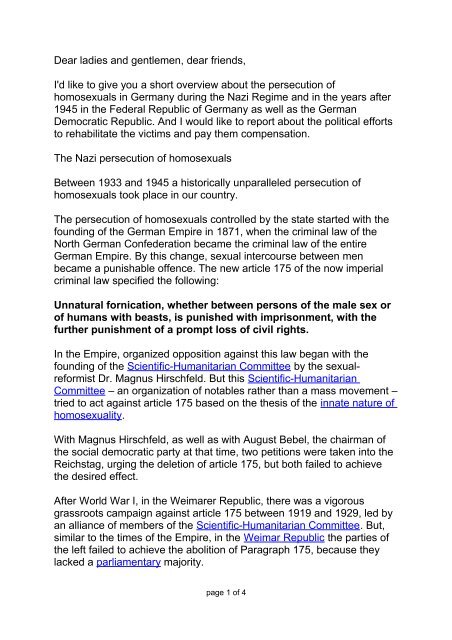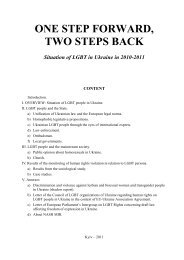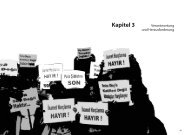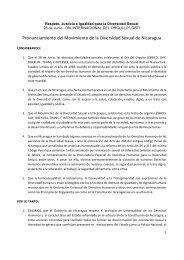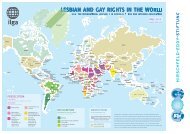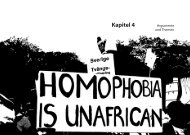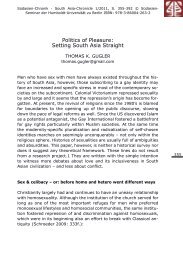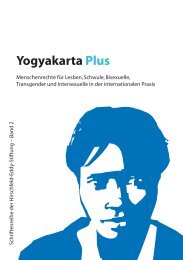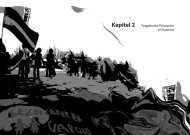Sehr geehrte Damen und Herren, liebe Freundinnen und Freunde,
Sehr geehrte Damen und Herren, liebe Freundinnen und Freunde,
Sehr geehrte Damen und Herren, liebe Freundinnen und Freunde,
- No tags were found...
You also want an ePaper? Increase the reach of your titles
YUMPU automatically turns print PDFs into web optimized ePapers that Google loves.
Dear ladies and gentlemen, dear friends,I'd like to give you a short overview about the persecution ofhomosexuals in Germany during the Nazi Regime and in the years after1945 in the Federal Republic of Germany as well as the GermanDemocratic Republic. And I would like to report about the political effortsto rehabilitate the victims and pay them compensation.The Nazi persecution of homosexualsBetween 1933 and 1945 a historically unparalleled persecution ofhomosexuals took place in our country.The persecution of homosexuals controlled by the state started with thefo<strong>und</strong>ing of the German Empire in 1871, when the criminal law of theNorth German Confederation became the criminal law of the entireGerman Empire. By this change, sexual intercourse between menbecame a punishable offence. The new article 175 of the now imperialcriminal law specified the following:Unnatural fornication, whether between persons of the male sex orof humans with beasts, is punished with imprisonment, with thefurther punishment of a prompt loss of civil rights.In the Empire, organized opposition against this law began with thefo<strong>und</strong>ing of the Scientific-Humanitarian Committee by the sexualreformistDr. Magnus Hirschfeld. But this Scientific-HumanitarianCommittee – an organization of notables rather than a mass movement –tried to act against article 175 based on the thesis of the innate nature ofhomosexuality.With Magnus Hirschfeld, as well as with August Bebel, the chairman ofthe social democratic party at that time, two petitions were taken into theReichstag, urging the deletion of article 175, but both failed to achievethe desired effect.After World War I, in the Weimarer Republic, there was a vigorousgrassroots campaign against article 175 between 1919 and 1929, led byan alliance of members of the Scientific-Humanitarian Committee. But,similar to the times of the Empire, in the Weimar Republic the parties ofthe left failed to achieve the abolition of Paragraph 175, because theylacked a parliamentary majority.page 1 of 4
Very fast, after the takeover of the Nazis, in 1933 they crushed theorganizations of the homosexual rights movement of the WeimarRepublic. Associations were disbanded, meeting places and publishersshut down. In 1935 the Nazis exacerbated article 175 by redefining thecrime as a felony and thus increasing the maximum penalty from sixmonths' to five years' imprisonment.Further, by removing the adjective widernatürlich ("against nature") theyremoved the longtime tradition that the law applied only to penetrativeintercourse. A criminal offense would now exist if "objectively thegeneral sense of shame was offended" and subjectively "thedebauched intention was present to excite sexual desire in one ofthe two men, or a third."Beyond that a new article 175 a was created, punishing "qualified cases"as schwere Unzucht ("severe lewdness") with no less than one year andno more than ten years in the jail. These severe lewdness included:• sexual relations with a subordinate or employee in a work situation,• homosexual acts with men <strong>und</strong>er the age of 21,• male prostitution.According to the official rationale, article 175 was amended in theinterest of the moral health of the Volk – the German people – because"according to experience" homosexuality "inclines toward plaguelikepropagation" and exerts "a ruinous influence" on the "circlesconcerned".This aggravation of the severity of article 175 in 1935 increased thenumber of convictions tenfold, to 8,000 convictions annually. Only abouthalf of the prosecutions resulted from police work; about 40 percentresulted from reports (Strafanzeige) by non-participating observers, andabout 10 percent were denouncements by employers and institutions.As opposed to ordinary police, the Gestapo (secret state police) wasauthorized to take gay men into preventive detention (Schutzhaft) ofarbitrary duration without an accusation. This was often the fate of socalled"repeat offenders": at the end of their sentences, they were notfreed but sent to a concentration camp for additional "reeducation"(Umerziehung).Only about 40 percent of these pink triangle prisoners – whose numbersamounted to an estimated 10,000 – survived the camps. Some of them,page 2 of 4
after being freed by the Allied Forces, were placed back into prison,because they had not yet finished court-mandated terms of imprisonmentfor homosexual acts.Between 1935 and 1945, the Nazi justice system condemned aro<strong>und</strong>50,000 men for homosexual acts.Continuation of the persecution after 1945The killings stopped in 1945, the persecution of homosexuals continued.In both German states gays continued to be agitated against by thepolice and prosecuted. In the Federal Republic of Germany (WestGermany) article 175 remained unaltered until 1969. 50,000 criminalconvictions took place based on article 175 – as many as during the Nazidictatorship.For this reason, the German historian Hans-Joachim Schoepscommented bitterly in 1963 that “For homosexuals, the Third Reichhas not yet ended”.The German Democratic Republic (East Germany) established the article175 in 1950 in the reduced version of former Prussia. So homosexualswere bothered somewhat less than in West Germany, but there are noreliable figures. The figures were not published, because party andgovernment of the German Democratic Republic were of the opinion thathomosexuality was a relic of the bourgeoisie and was without base in theworking class, therefore it wasn't necessary to talk about it in public.Only in 1969, after the Social Democratic Party of Germany, the SPD,entered the federal government for the first time, homosexuality betweenadults was decriminalised. The age of consent, however, remainedhigher than that for heterosexuals. This discriminatory special provisionfor homosexuality was not scrapped until 1994. Since then, article 175has been repealed.Efforts regarding rehabilitation and compensation for the victimsIn 2002 the parliament nullified the convictions made <strong>und</strong>er the Naziregime between 1933 and 1945 and rehabilitated the convictedhomosexuals. They can apply for compensation. But the victims of thepost-war period are going away empty-handed. The parliament onlyregretted that gay have been criminalized for decades.page 3 of 4
After an initiative of the Senate of Berlin the judiciary committee of theB<strong>und</strong>esrat (the upper house of the parliament) just recently, on 26September, addressed the rehabiliation of the homosexuals convicted inthe Federal Republic of Germany after 1949 and agreed to the proposalof the state of Berlin to take measures to rehabilitate and support thesepeople. Their unjust convictions shall be nullified by the parliament aswell.But up to now there are two contradicting positions. As opposed to theGreens and the Leftist party the ruling parties and the Social Democratssee legal difficulties in retroactively nullifying the convictions.Only the fact that this concern has reached the highest political boardsafter so many years of fight to no avail is something we regard as asuccess. The LSVD as a lesbian-gay lobby organization continues tofight for the late, but not too late right of the victims of persecution.We are not giving up, the efforts to erect a national memorial in Berlin tocommemorate the homosexuals persecuted in the Nazi times wascrowned with success after many years of sometimes grueling andfrustrating intensive political work: In 2003 the German B<strong>und</strong>estagunanimously voted for the erection of a memorial in the middle of Berlin.With this memorial the Federal Republic of German intends to pay tributeto all persecuted and murdered victims, keep alive the memory ofinjustice and show a permanent flag against intolerance, hostility andsocial exclusion of gay and lesbians. In 2008 the memorial was handedover to the public and is being visited by many people every day, alsoand especially by travelers coming from countries where homosexualityis still a crime.May activists in those countries feel encouraged and supported in theirfight for freedom, equal rights and respect by the efforts in Germanywhich have eventually lead to success.Thank you very much for your attention.page 4 of 4


